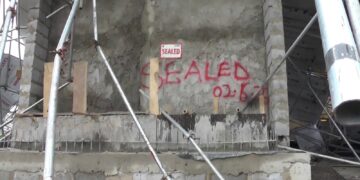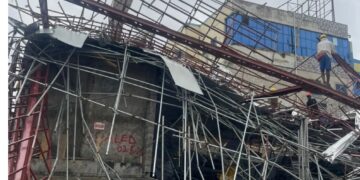The notorious Ogbomoso-Oyo road, a crucial link between the southwestern and northern regions of Nigeria, is seeing improvements as commercial drivers take matters into their own hands. On Wednesday, members of the Nigerian Association of Road Transport Owners (NARTO) and the Park Manager System (PMS) began filling the road’s severely damaged sections with hardcores and other materials, aiming to alleviate the sustained traffic gridlock.

For months, the condition of the road has been a source of national embarrassment, with numerous calls from residents to both state and federal authorities for urgent repairs going unheeded. The dilapidated state of the road has rendered it nearly impassable, frequently leading to the blockage of articulated vehicles, commonly known as trailers, which have been stuck for up to four days in Ogbomoso.

NARTO leader Comrade Atilade Ajala (popularly known as “Baba Shallow”) in. Chat with Ogbomoso Insight expressed frustration over the government’s inaction. “We initiated this repair project when the traffic congestion became excessive and unbearable,” Ajala stated. “Trailers have taken to township roads, causing additional damage, and we have witnessed at least three vehicle accidents in the past two weeks that have led to loss of life. We couldn’t stand by while our town was thrown into chaos.”
The transport workers contributed resources to acquire necessary materials, including gravel and stone, and organized labor for repairs. Ajala noted, “Nothing less than eight people have lost their lives at this specific location. We can’t continue waiting for the government while we suffer.”
While rumors circulate about a Senate delegation planning a visit next month for an on-the-spot assessment, Ajala criticized the delay, saying, “We can’t wait any longer. What if something happens before then? We have to take action now.”
He lamented the state of roads in southwest Nigeria, highlighting the contrast between the inattention paid to local infrastructures and recent government decisions to invest millions in roads such as the Lagos-Calabar route. “It’s unfortunate that Yorubaland often suffers from such negligence. Roads like the Ibadan-Oyo-Ogbomoso-Ilorin expressway, which has been under construction for over 20 years, remain incomplete,” he said, urging the government to expedite repairs on both new and old expressways.
Ajala noted that their repairs have begun to yield results, with traffic flow already improving. He criticized local politicians for their lack of effectiveness and support, saying, “They talk about fixing dates for assessments, but how long will we wait? The situation will only deteriorate.”
He emphasized the economic importance of the road, not only for Nigeria but for the broader West African region, which it connects to countries like Ghana, Burkina Faso, Chad, and Niger. “This road is essential for trade and mobility. It cannot be left in such a dire state,” he declared, adding that their repair efforts would also extend to other damaged sections near Bowen University Teaching Hospital and the express interchange at Isale-General.















